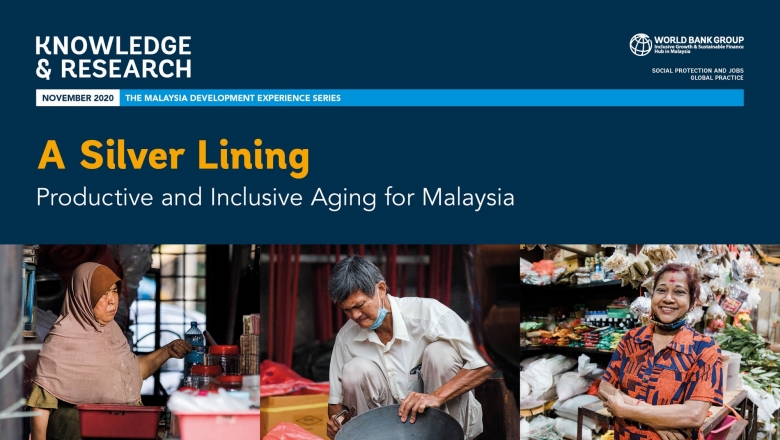Malaysia can reap socio-economic dividends by improving policies for inclusive employment, income security and aged care
As Malaysia transitions into an aging society this year, fostering productivity, protecting incomes and building an inclusive aged care system will help reap socio-economic dividends from this shift, according to a new World Bank report “A Silver Lining: Productive and Inclusive Aging for Malaysia”.
More than 7 percent of the country’s population will be aged 65 and above in 2020 – which means Malaysia is becoming an aging society. The rate of aging will increase in the coming years and the share of the population aged 65 and above is projected to double to 14 percent by 2044 and to reach 20 percent by 2056. Meanwhile, the ratio of the number of people aged 65 and above over those of working age is also projected to rise, raising old-age dependency in households.
“The realization of productive and inclusive aging requires policies that build on solid evidence. As in nearly all high-income countries, longer working lives, will in turn require gradual adjustments to the age when most Malaysians retire,” said Dato’ Sri Mustapa Mohamed, Minister in the Prime Minister’s Department (Economy) in launching this report today. “In parallel, policies are needed that foster workers’ productive employment—such as enhanced opportunities for training and lifelong learning. Such policies will allow Malaysians to work longer, be healthier for longer, with less physically demanding occupations, and with more digitally-enabled work places.”
Harnessing the productive potential of persons age 50 and above can help mitigate the growth effects of aging. Compared to other upper middle- and high-income countries, the employment rate of those age 50 to 64 in Malaysia is low, especially among women. Macroeconomic projections indicate that increasing the retirement age to 65 could raise GDP growth by 0.3 percentage points per year.
The report also notes that relevant international experience and data for Malaysia finds no evidence that increased employment among older workers negatively affects the employment prospects of younger workers. If more Malaysians age 50 to 64 are active on the labor market, this can also serve to address talent shortages. Meanwhile, developing the aged care sector can position the industry to be a new driver for economic growth, job creation, improved social services, and a better quality of life.
“Malaysia has an opportunity to better protect its elderly citizens and enable them to age with with dignity and purpose,” said Firas Raad, World Bank Group Representative to Malaysia and Country Manager. “The provision of minimum income protection for older Malaysians will require further improvements in the coverage and adequacy of social insurance schemes. A broadly targeted tax-financed social pension may also be required to comprehensively cover the population.”
Recognizing the scope and complexity of aging, the report provides multiple short to long-term policy recommendations. In the short-term, the recommendations include broadening EPF coverage to more self-employed and informal workers, improving quality standards of aged care homes and enhancing opportunities for training and lifelong learning. In the longer term, the report calls attention to the need for longer working lives which in turn will require gradual adjustments to the minimum retirement age and EPF’s minimum withdrawal age in line with increasing life expectancy. At this transition point, made all the more challenging by the COVID-19 pandemic, 2020 is a crucial year for Malaysia to take steps to better protect its aging population and to ensure that they are not left behind in the future.

